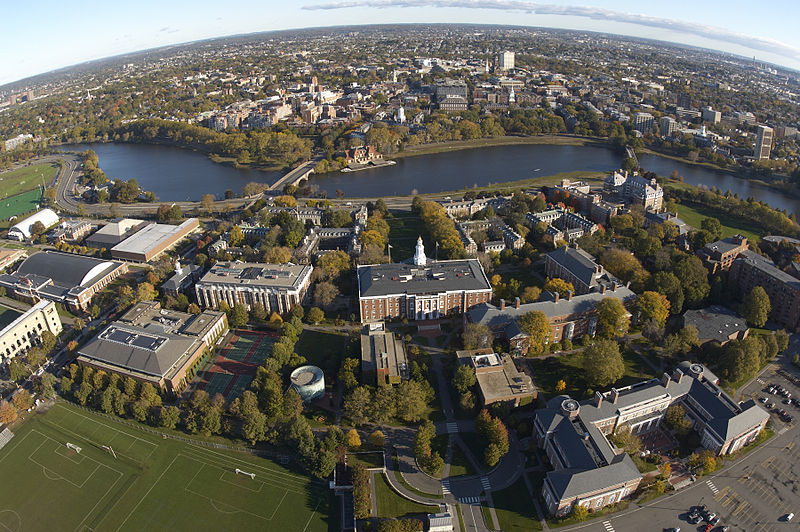Harvard Business School (HBS) announced that it would build a significant new structure on the School’s Boston campus, where HBS can harness the energy and creativity of the thousands of students, faculty, alumni, and leaders of all kinds who convene there each year. Expected to open in 2018, the facility will combine the elements of a large-scale conference center, a performance space, and an intimate community forum.
The new building will be named Klarman Hall in recognition of a generous gift from Seth and Beth Klarman. Seth Klarman (MBA 1982) is president and CEO of The Baupost Group, a Boston-based investment management firm. His wife, Beth Klarman, is president of the Klarman Family Foundation. Both are also members of the Business School’s Board of Dean’s Advisors.
In discussing their inspiration for the gift, Mr. Klarman noted that Harvard Business School has a unique capacity to contribute to the public dialogue about effective and responsible management.
“When you bring people with talent, vision, and ambition together in a space designed specifically to facilitate connections, conversation, and debate, the potential for transformative ideas and action is limitless,” said Mr. Klarman. “Beth and I believe game-changing innovations will emerge from this space. HBS has played an important and ongoing role in my life and it’s a privilege to able to give back to a school that has given us so much.”
Harvard Business School hosts some 700 events a year ranging in nature from research conferences to symposia to cultural events. Tens of thousands participate. Its residential campus is a place where learning happens not just in the classroom but also over meals, in the hallways, and in common areas throughout the campus. As the School’s renowned case method of discussion-based learning demonstrates, HBS is a place where frank conversations can lead to consensus and ultimately, action.
Noted HBS Dean Nitin Nohria, “With this wonderful gift, the Klarmans enable us to bring together leaders—in academia, in business, and in policy—in a world-class way to spur not just dialogue but action. We know that if we can create a gathering place of high functionality and high purpose, and if we leverage our convening power within that space, we can significantly affect the public debate about issues that are of the greatest importance to people at this School, in this country, and around the globe. All this is in keeping with Harvard Business School’s mission of educating leaders who make a difference in the world.”
"Through their efforts in business, their engagement in their community, and their involvement in philanthropy and charitable work, Beth and Seth Klarman have set the highest possible standard for those who want to dedicate their resources, as they have stated, to 'the service of society's greatest challenges,'" said Harvard University President Drew Gilpin Faust. "Their generosity will make lasting marks at Harvard and beyond. We are grateful to them for this magnificent gift and for what it will do to enhance the educational experiences of future generations of students, faculty, and leaders who will gather at Harvard Business School to exchange ideas and have an impact on scholarship and society."
To be located next to the Spangler Center at HBS, Klarman Hall will be designed by Boston-based William Rawn and Associates, architects of the recently opened Tata Hall, as a vibrant space with an eye toward flexibility, adaptability, and accessibility.
“Given the wide range of events and gatherings that will take place in Klarman Hall, it’s imperative that the space be able to support, complement, and facilitate activities both big and small,” said Rawn. “We are drawing inspiration and insight from places that feature the world’s greatest thinkers, leaders, and performers and trying to bring those elements together in one place. At this point, “he continued, “we know that the new facility will almost certainly combine an outstanding core auditorium with smaller breakout spaces of appropriate quantity and quality. Given the speed of change, the structure will certainly be designed to accommodate technologies that haven’t even been imagined yet. My colleagues and I are all honored and excited to be a part of this important project.”
Klarman Hall will feature:
- State-of-the-art technology enabling connections with scholars and thought leaders around the world;
-
Stage and backstage capacity, acoustics, and equipment for spoken-word events, films, and cultural events;
-
A multipurpose foyer; and
-
Pre-function reception space.
HBS has established LEED Gold as the campus standard and currently has seven-LEED certified buildings on campus.
“Thanks to the generosity of Beth and Seth Klarman,” said John Hess (MBA 1977), chairman of the current HBS Capital Campaign, “Harvard Business School will continue to be a leader for many years to come in bringing people together to discuss and advance important and innovative ideas that will have an impact on business and society. We are deeply appreciative of their faith in the School and Dean Nohria’s leadership and will do all we can to fulfill the dream that this gift makes possible.”
Related Stories
Museums | Aug 11, 2010
Design guidelines for museums, archives, and art storage facilities
This column diagnoses the three most common moisture challenges with museums, archives, and art storage facilities and provides design guidance on how to avoid them.
| Aug 11, 2010
Broadway-style theater headed to Kentucky
One of Kentucky's largest performing arts venues should open in 2011—that's when construction is expected to wrap up on Eastern Kentucky University's Business & Technology Center for Performing Arts. The 93,000-sf Broadway-caliber theater will seat 2,000 audience members and have a 60×24-foot stage proscenium and a fly loft.
| Aug 11, 2010
Citizenship building in Texas targets LEED Silver
The Department of Homeland Security's new U.S. Citizenship and Immigration Services facility in Irving, Texas, was designed by 4240 Architecture and developed by JDL Castle Corporation. The focal point of the two-story, 56,000-sf building is the double-height, glass-walled Ceremony Room where new citizens take the oath.
| Aug 11, 2010
Carpenters' union helping build its own headquarters
The New England Regional Council of Carpenters headquarters in Dorchester, Mass., is taking shape within a 1940s industrial building. The Building Team of ADD Inc., RDK Engineers, Suffolk Construction, and the carpenters' Joint Apprenticeship Training Committee, is giving the old facility a modern makeover by converting the existing two-story structure into a three-story, 75,000-sf, LEED-certif...
| Aug 11, 2010
Utah research facility reflects Native American architecture
A $130 million research facility is being built at University of Utah's Salt Lake City campus. The James L. Sorenson Molecular Biotechnology Building—a USTAR Innovation Center—is being designed by the Atlanta office of Lord Aeck & Sargent, in association with Salt-Lake City-based Architectural Nexus.
| Aug 11, 2010
San Bernardino health center doubles in size
Temecula, Calif.-based EDGE was awarded the contract for California State University San Bernardino's health center renovation and expansion. The two-phase, $4 million project was designed by RSK Associates, San Francisco, and includes an 11,000-sf, tilt-up concrete expansion—which doubles the size of the facility—and site and infrastructure work.
| Aug 11, 2010
Goettsch Partners wins design competition for Soochow Securities HQ in China
Chicago-based Goettsch Partners has been selected to design the Soochow Securities Headquarters, the new office and stock exchange building for Soochow Securities Co. Ltd. The 21-story, 441,300-sf project includes 344,400 sf of office space, an 86,100-sf stock exchange, classrooms, and underground parking.
| Aug 11, 2010
New hospital expands Idaho healthcare options
Ascension Group Architects, Arlington, Texas, is designing a $150 million replacement hospital for Portneuf Medical Center in Pocatello, Idaho. An existing facility will be renovated as part of the project. The new six-story, 320-000-sf complex will house 187 beds, along with an intensive care unit, a cardiovascular care unit, pediatrics, psychiatry, surgical suites, rehabilitation clinic, and ...
| Aug 11, 2010
Colonnade fixes setback problem in Brooklyn condo project
The New York firm Scarano Architects was brought in by the developers of Olive Park condominiums in the Williamsburg section of Brooklyn to bring the facility up to code after frame out was completed. The architects designed colonnades along the building's perimeter to create the 15-foot setback required by the New York City Planning Commission.








